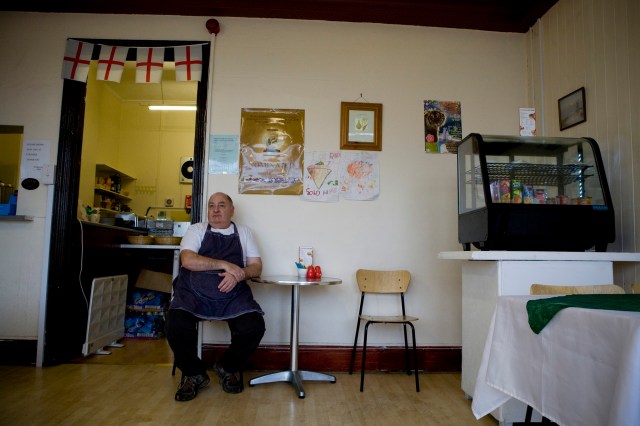Crumbles Cafe, in Lowestoft. Credit: Sam Mellish / In Pictures via Getty

“It’s shit,” Dean fires back when I ask what he thinks of this place. “Gone totally downhill. It’s dying.” He takes another swig of his pint. It isn’t yet midday, but Dean (he doesn’t give me his surname) and a group of friends have already settled at a table outside the Wetherspoon’s pub by the railway station.
Lowestoft isn’t dead yet. But it is on life support. It’s hard to imagine, as you wander along its depleted high street and past the shabby facades looking out over the 19th-century harbour, that this town on the coast of sleepy Suffolk was once an industrial powerhouse. Until, that is, you begin to stumble upon the innumerable reminders – the museums and statues and faded signs on old maritime buildings – of its former status as a major fishing port. You can’t avoid them. And neither should you wish to. For you cannot understand any town without knowing its history.
But no place can survive on glories past. These days, Lowestoft is just one of our many battered and blighted former industrial towns, the sort that were once the pride of the nation but are now regarded by some among our political and cultural elites as a bit of an embarrassment. This old maritime jewel isn’t even treading water; it is slowly sinking.
Dean moved his family up from South East London 34 years ago. “I’d go back if I could.” I ask how things have changed. “The fishing industry has been destroyed. You used to be able to hop from boat to boat in the harbour. Now you’d drown.” What else? “Factories have closed. The main shops have gone. All we’ve got left is takeaways and charity shops. A lot more foreigners live here now. But I’m not prejudiced,” he swiftly assures me.
Almost everyone I speak to here says the same thing. Fishing destroyed. Factories closed. Shops gone. Town in decline.
In its heyday, Lowestoft was home to a fleet of over a thousand trawlers and drifters. Some vessels fished in waters as far afield as Norway. It is said that if you weren’t employed in the industry yourself, you knew someone who was. Fishing was later supplemented by the presence of major employers such as Shell, Sanyo, Boulton and Paul, and Eastern Coachworks.
The town benefitted additionally through its appeal as a holiday destination. Holidaymakers would flock here in summers past to enjoy the golden beaches and other attractions.
Today, the only trawler – the Mincarlo – doesn’t leave the harbour (it is a museum ship), and the big firms have decamped. The holidaymakers still come but, in truth, it’s hard to imagine Lowestoft as a resort of choice.
The belief that the European Union – and in particular the Common Fisheries Policy with its rigid quota system – is responsible for the town’s plight is widespread. There is much truth in it, of course. But it isn’t the only explanation. God knows successive British governments must take their share of responsibility for the evisceration of our industrial base.
Still, it’s no wonder that 63% of the electorate in this part of Suffolk voted Leave in the referendum and almost 40% for the Brexit Party in the recent European elections. The Remain campaign never really stood a chance here. The EU has become the symbol of all that has gone wrong in Lowestoft. Brave would be the politician who ventured into this town to tell people they got it wrong and must vote all over again.
Looking in at the Woodbine café (established 1895) near the entrance to the docks, I get talking to some locals. Christie Vorster and her family were forced out of Robert Mugabe’s Zimbabwe when she was 13. Now, 17 years later, she is unemployed and in receipt of Universal Credit. She hunts daily for worthwhile employment. Her last job, at a day centre, didn’t offer enough hours. She isn’t hopeful of finding anything soon.
Her despair is justified. The most recent figures I could find reveal that 33% of the town’s population have no qualifications, and the number of young people in receipt of out-of-work benefits across the wider district is double the national average.
Those in work don’t have it much easier here. A report last year by the Low Pay Commission showed that the local authority has one of the highest rates of workers earning only the minimum wage across the whole of Britain.
“There’s just nothing for young people to do here,” Christie says.
We are joined in our conversation by 79-year-old Billy Crago. Billy fished out of these waters for half a century, eventually buying and operating his own trawlers. “Fishing was a huge industry here,” he tells me. “Everything depended on it. Other industries relied on it: boat-building, engineering works, dry docks. But they all went when fishing went.” I tell him I witnessed something similar when much of the Ford motor plant was closed in my hometown of Dagenham. I feel his pain.

Billy Crago at Woodbine café
“The fish market workers used to queue along the road to come in here when I was a little girl,’ says Rose Sinacola, who serves the teas and breakfasts in this place. ‘They would bring their urns with them. It would open at six o’clock in the morning. But everything’s changed now.”
“There’s a lot of violence,’ comes a voice from a table behind me. Christine McKensey-Stowe is sitting with a friend. She is 63 and in receipt of Employment and Support Allowance, surviving on £70-a-week. She says she is too ill to work and has been waiting for a home medical assessment for 14 months. ‘There’s a gang culture. And they’re starting young. I was abused by a nine-year-old in McDonald’s for telling him off for smoking.”
Christie and Christine begin swapping tales of violence and arson and other such lawlessness. I ask if they ever see police officers walking the beat. Christine looks at me with an equal measure of bewilderment and derision. I may as well have asked if Elvis comes to town for the occasional gig. She nods towards the high street. “It’s tough for old people when the shops close down. Most of them can’t work a computer, so they can’t shop online. It must be terrible for them.”
“And the rents are too high for young people,” Rose says. “Unless you’ve got a well-paid job, you can never expect to get your own place.”
I ask if any of them has faith in politicians to put things right. They don’t. “I’d chuck them all out and start again,” Christine says. “They don’t bother about people here. Everything’s being cut. I don’t know much about politics, but I know enough to know they don’t care about us.”
I get the sense that neither the modern Left’s preoccupation with identity politics and class war, nor the New Right’s zeal for free trade, nor the liberal cosmopolitanism of the so-called ‘centrists’ would resonate here at all. I doubt that any among Jeremy Corbyn or Jacob Rees-Mogg or Chuka Umunna would be welcomed as some knight in shining armour in this town.
Buzzwords such as ‘diversity’, ‘equality’ and ‘inclusivity’ are far from the lips of people in Lowestoft. But speak about work and community and family, and the conversation comes alive. It is obvious that there is a hankering for something much more meaningful than that which is offered by the political mainstream, something rooted in the concepts of place and belonging and social solidarity.
These folk are atomised and disaffected for sure. But there is a residual community spirit that refuses to be extinguished. They are desperate to be proud of their town – if only it would let them.
Leaving the Woodbine, I head towards the war memorial near the entrance to South Pier. A collection of wreaths lie at the base of the granite obelisk. One displays the logo of Ukip. There is nothing from the other parties. I reflect on what the men immortalised here would think of their town today. They battled against fascism, of course. Real fascism. I wonder how they might react to their descendants being accused of enabling fascism for daring to vote for a return of the very national sovereignty they gave their lives to defend.
Before I depart, I take the short walk up to Ness Point, the most easterly point of the British Isles. This small headland juts out into the waves, as if straining to be joined with continental Europe, only to be reined back in by the rest of the country. Westminster is just over a hundred miles from here as the crow flies. It may as well be an ocean away.
Looking out across the grey, forbidding North Sea, I imagine the days when armadas of drifters and trawlers would leave this place, sometimes for weeks on end, to ply their trade on the unforgiving waves. I picture, too, the families of the fishermen sitting by oil lamps in their modest little cottages, anxiously awaiting the return of their loved ones. These days the anxieties of the townsfolk stem not from meteorological storms, but from those of globalisation and unfettered capitalism.
Heading back inland on the train as the light begins to dwindle, we are quickly into the Suffolk countryside. The spires and farms beyond the carriage window are evocative of A.E. Housman’s “Into my heart an air that kills” – his lament for a world lost and unrecoverable. There may be no blue remembered hills among these flatlands, but it is certainly a land of lost content. I see it shining plain.
For Lowestoft is a tale of our times. Its long, slow decline stands as a testament to the alienation and neglect of our post-industrial and coastal communities. Once confident and proud, they now fight to keep their head above the waterline. We should feel a sense of shame for having abandoned these places to their fate.
Yet, for all that, I didn’t detect a seething fury among the people I left behind. More a sense of resignation and acute disenchantment. A quiet anger and utter pessimism in the prospect of anything or anyone coming to their aid.
I don’t expect the good folk of Lowestoft to be hammering at the gates of parliament any time soon. But I do fear that, such is their cynicism in the entire political process and its ability to improve their lives, they will – if they haven’t done so already – disengage from it completely. Perhaps never vote again.
That may suit some people, of course – those who privately regard voters in these communities with contempt and believe the country would be better off if their voices stayed unheard. But for the health of our democracy and civic life – and most importantly our sense of ourselves as one nation – the implications of that would, in the long run, be far more profound.










Join the discussion
Join like minded readers that support our journalism by becoming a paid subscriber
To join the discussion in the comments, become a paid subscriber.
Join like minded readers that support our journalism, read unlimited articles and enjoy other subscriber-only benefits.
Subscribe